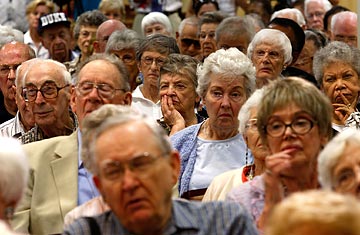
Residents listen during a health-care forum at Greenspring Retirement Community in Springfield, Va.
Many observers are puzzled by the level of anger and vitriol senior citizens have been directing toward their besieged elected representatives during recent health-care town halls. But no one can be more surprised, or put in a more uncomfortable position, than the organization that supposedly represents their interests, AARP. The 40 million–member advocacy group, after all, signed on early as a key supporter of President Obama's health-care-reform plan, and now it finds itself on the defensive, scrambling to win back much of its own membership. "A year ago, it seemed obvious that AARP would be for health reform," says the group's legislative-policy director David Certner. "Our membership as far as we could tell was quite ginned up about health-care reform."
Since then, members' views have apparently shifted. At least 60,000 AARP members quit the organization between July 1 and mid-August specifically because of its pro-reform stance, and the organization's online message boards are littered with anti-reform posts. (AARP is quick to point out that during the same period, it signed up 400,000 new members.) According to a poll conducted Aug 4-11 by the Kaiser Family Foundation, just 23% of Americans over 65 feel they would be better off under reform proposals and even fewer believe the Medicare program would benefit. While plenty of other groups are united against reform, opposition from seniors, who consistently have the highest voter turnout rates of any age group — especially in midterm elections like the one next year — may prove especially perilous for the reform effort.
AARP's support for Democrats' health-care-reform proposals is critical this year. The group is one of several health-care power players the White House struck deals with in hopes of shoring up support for reform early on. In June, AARP, President Obama and PhRMA, a group representing drug companies, announced they had agreed to a plan to help close the Medicare Part D prescription-drug coverage gap known as the "doughnut hole," which leaves seniors without coverage after their drug costs exceed $2,700 and until they spend $4,350 of their own money. The White House deal, triggered if reform becomes law, would save seniors 50% on name-brand drugs and cost the drugmakers $80 billion. But this boon for the elderly was apparently not enough to sell seniors on reform overall. "Somewhere along the line, we seemed to have veered really off course based on a lot of the misinformation and disinformation that clearly is making its way to the older population in particular," says Certner.
It's not hard to see how seniors got spooked, which to some degree is an indictment of AARP, not to mention the Democrats. Sarah Palin and other conservative opponents have helped fuel rumors that the House health-reform bill calls for the establishment of "death panels" to decide when to cut off medical care for seniors. (This is not true — the House bill includes a provision to reimburse doctors who provide voluntary end-of-life counseling to patients.) Judging by comments at town-hall meetings, the elderly are also fearful that Democratic proposals would take funding away from Medicare to pay for coverage for Americans who don't currently have health insurance. This is not entirely untrue; Democratic proposals call for spending money to help insure the uninsured, alongside targeted reductions in Medicare reimbursements to doctors and hospitals and major funding cuts to Medicare Advantage, which allows seniors to buy private insurance with federal dollars. Most health-policy experts, however, believe these cuts are necessary for the program to remain financially solvent.
